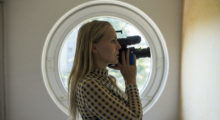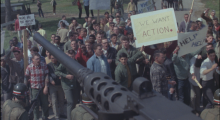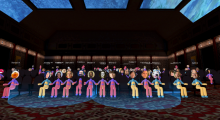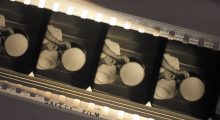Authors — Vadim Rizov
-
Rotterdam 2022 Critic’s Notebook: Third Grade, Met mes, The Dream and the Radio

It’d been nearly a decade since I’d seen a Jacques Doillon film during its premiere festival run, but Third Grade almost immediately reminded me what his work, since at least 2003’s Raja (where I first came in), feels and looks like. Restless characters roam with the sharklike compulsion of actors determined to charge every single moment; the camera slowly pans or dollies to keep everyone just within the frame’s boundaries, resting during the occasional static composition but rarely for long. Conflict is everyone’s inevitable destination, and sooner rather than later; people begin at such virulent odds that you fear for both their physical […]
by Vadim Rizov on Feb 18, 2022 -
Sundance 2022 Critic’s Notebook: The Mission, Utama

The beginning of Tania Anderson’s The Mission transported me from my virtual festival cocoon to Utah’s snowy slopes and the towns below; the ambient Mormonism emanating from those surroundings is a shadow structure of any IRL Sundance. Anderson’s debut feature documentary invites viewers to observe the nice-seeming young men and women dispatched from there to proselytize on behalf of the Church of Jesus Christ of Latter-Day Saints. The opening introduces four main subjects—two male, two female—preparing to separate from their families for a two-year term, beginning with nine weeks of missionary training camp in Provo. From there, they’re sent to Finland, whose total […]
by Vadim Rizov on Jan 27, 2022 -
“Originally I Had a 200-Page Script”: Ricky D’Ambrose on The Cathedral

Ricky D’Ambrose’s second feature, The Cathedral, begins in the mid-’80s, with a narrator outlining the history of the Damrosch family: father Richard (Brian d’Arcy James), mother Lydia (Monica Barbaro) and son Jesse (Hudson McGuire as an adolescent, Robert Levey II as a pre-teen, William Bednar-Carter as a teenager). The film begins shortly before the latter’s birth and continues into the mid-aughts, outlining an often difficult Long Island upbringing. Richard casts a dark shadow over Jesse’s upbringing. The years’ passing is concretized datewise by a plethora of broadcast news footage—a new element for D’Ambrose’s work in a feature full of them. I […]
by Vadim Rizov on Jan 26, 2022 -
Sundance 2022 Critic’s Notebook: Dos Estaciones, Meet Me in the Bathroom

In the opening sequence of Juan Pablo González’s second feature, Dos Estaciones, DP Gerardo Guerra’s Steadicam roves a tequila farm’s fields as workers chop down agave plants; when they pause for lunch, the camera pans equally slowly, seemingly without planning, to bring whoever’s speaking into frame. In these opening moments, Dos Estaciones could be any one of a number of post-Lisandro Alonso films composed of tracking shots, slow pans and nonprofessional performances by Latin American laborers, differentiated only by the skill and specifics of their execution. A static shot then introduces farm owner, Maria Garcia (Teresa Sánchez), trying and failing to start her […]
by Vadim Rizov on Jan 24, 2022 -
Sundance 2022 Critic’s Notebook: Speak No Evil, Resurrection, Happening

Shudder announced the acquisition of Christian Tafdrup’s Speak No Evil just before the film’s Sundance premiere. It’s probably one of this year’s breakout titles—at any rate, enough people in my Twitter feed recommended it to redirect me from previously planned viewing and Tafdrup’s freshly signed to WME. In his “Meet the Artist” video, the co-writer (with his brother, Mads) and director displays an entertaining flair for hammy hucksterism in an Alfred Hitchcock Presents intro vein. Sitting in front of a fire, he smilingly reads out comments from a test screening (“The director has to be mentally examined”; “A horrible, horrible film”; “This film […]
by Vadim Rizov on Jan 23, 2022 -
“I Don’t Want to Make Seamless Films”: Sierra Pettengill on Riotsville, USA

Where Sierra Pettengill’s previous all-archival film, The Reagan Show (co-directed with Pacho Velez), asked the question “How did we get here?” by re-examining the ’80s, her new feature Riotsville, USA goes back further, to the oft-examined period from roughly 1967 to 1968. As she explains in a press kit interview conducted by programmer Nellie Killian (also credited as a researcher on the film), the project originated when, while reading Rick Perlstein’s Nixonland, Pettengill grew curious about what, exactly, might have happened at the titular sites. “I Googled [“Riotsville”] and I didn’t find much of anything—and for me, as an archival researcher, that’s just the […]
by Vadim Rizov on Jan 22, 2022 -
Sundance 2022 Critic’s Notebook: When You Finish Saving the World

I eased into the opening hours of my second virtual Sundance Film Festival better prepared than at this time last year. The festival, of necessity, pivoted back to online-only mode with so little heads-up time that seasonal staffers evidently learned they were out of gigs at the same time everyone else on Twitter heard about the change of plans—financially devastating for the suddenly unemployed and uncompensated, very regrettable for filmmakers, logistically fairly easy to adjust to for everyone else after a few years’ virtual fest training. This time last year I had a projector, but also roommates and hence the […]
by Vadim Rizov on Jan 21, 2022 -
The (Approximately) 30 Movies of 2021 Shot on 35mm

As I began, for the eighth year in a row (!), to research the year’s U.S. releases shot in 35mm1, the two movie events I was personally anticipating didn’t primarily revolve around that format. One was Anthology Film Archives’s pandemic-delayed retrospective of Canadian experimental filmmaker, multihyphenate artist and all-round hero Michael Snow—initially scheduled for March 2020, finally screened in December and finished just before Omicron started surging around me. Most of his films were shot and shown on 16mm, making the few 35mm inclusions startling for their comparative, immediately perceptible sharpness and sheer volume. I went all in, taking a […]
by Vadim Rizov on Jan 18, 2022 -
DOC NYC 2021: The Mole, Life of Crime 1984-2020 and Mr. Bachmann and His Class

Mads Brügger’s feature directorial debut, The Red Chapel, took a Tom Green-via-Sacha Baron-Cohen approach to infiltrating North Korea, with the director finagling himself and two comics — both adopted from North Korea, one with spastic paralysis — into the country. Given that it’s not hard to make an actual absurd environment appear absurd on screen, he emerged with fairly pointless cringe comedy: plenty of awkwardness all round but no real surprises. So it’s interesting to hear Brügger admit at the start of The Mole (initially a three-part series, shown at DOC NYC in its presumably final two-episode form) that The Red Chapel, while an […]
by Vadim Rizov on Nov 19, 2021 -
Bun B on the Houston Cinema Arts Society, Criterion Laserdiscs and Squid Game

In May of 2015, legendary rapper and Texan Bun B joined the board of directors of the Houston Cinema Arts Society—first conceived in 2007, with the first edition of its annual film festival held in 2009. This Friday sees the start of the 13th Houston Cinema Arts Festival, including centerpiece and closing night screenings of Bushwick Bill: Geto Boy, a documentary that allows the late artist to tell his story in his own words. Bun B will be moderating the latter Q&A, which is far from the first time he’s gotten out and pushed for the organization. My job, by definition, does not […]
by Vadim Rizov on Nov 11, 2021
